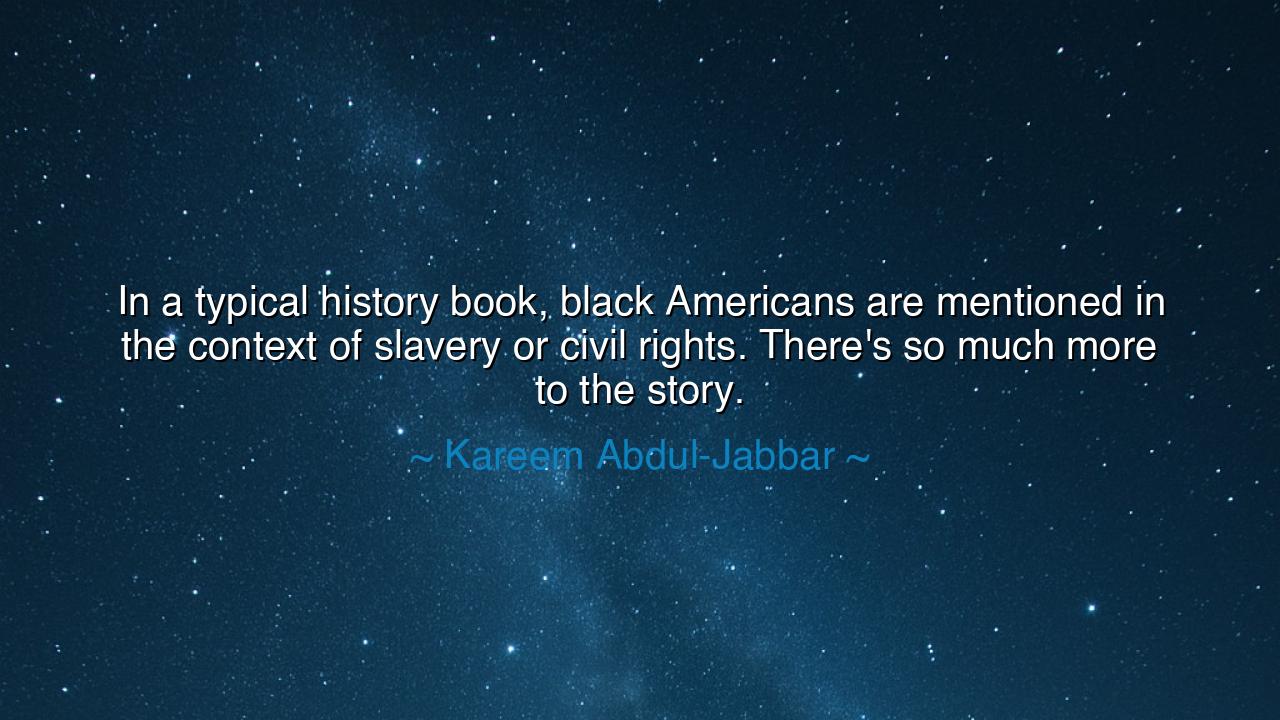
In a typical history book, black Americans are mentioned in the
In a typical history book, black Americans are mentioned in the context of slavery or civil rights. There's so much more to the story.






In the deep and measured voice of a thinker who has seen beyond the narrow lines of history, Kareem Abdul-Jabbar once spoke a truth that resounds through the ages: “In a typical history book, black Americans are mentioned in the context of slavery or civil rights. There’s so much more to the story.” These words are not merely a lament—they are a call to remembrance, a summons to restore what has been silenced. For history, when it forgets the fullness of a people, becomes not a record of truth but a shadow of it. Abdul-Jabbar, an athlete turned philosopher, speaks as one who knows that memory shapes identity, and that a people denied their past are denied their rightful place in the human story.
To understand the origin of this quote, we must look not only to the man who spoke it, but to the time in which he spoke. Kareem Abdul-Jabbar, born Ferdinand Lewis Alcindor Jr., rose to fame as one of the greatest basketball players in history. Yet his legacy extends far beyond the court. He became a writer, a historian, and a cultural voice, dedicated to illuminating the hidden chapters of the African-American experience. When he said these words, he was reflecting on the incomplete narratives taught to generations of students—stories that reduce the Black experience to two moments of suffering and struggle: slavery and civil rights. Between those two poles, the richness of Black achievement, thought, art, and innovation was too often left untold.
His words carry a wisdom known since ancient times: that a civilization is measured by the fullness of its memory. When a people’s contributions are erased, the world loses not just their story but a part of its own soul. The history of Black America is not only a chronicle of oppression—it is a symphony of resilience, intellect, and creativity. From the astronomers of Timbuktu to the scholars of the Harlem Renaissance, from inventors like Garrett Morgan and Madam C.J. Walker to writers like Zora Neale Hurston and James Baldwin, the tapestry of Black history stretches across every field of human endeavor. Abdul-Jabbar reminds us that to reduce such a heritage to bondage and protest is to blind oneself to the very power that has shaped nations.
Consider the story of Benjamin Banneker, the self-taught mathematician and astronomer born free in 18th-century Maryland. With little formal education, he mastered the science of the stars, predicted solar eclipses, and helped design the city of Washington, D.C. Yet his name, like those of countless others, is often lost beneath the weight of historical omission. His brilliance, like that of so many Black Americans, reveals that the story of a people cannot be confined to chains and marches alone—it is also a story of mind, mastery, and imagination. Such lives are proof that greatness does not wait for permission to exist; it burns wherever the human spirit endures.
Abdul-Jabbar’s quote also reminds us of a universal truth: that history, when told honestly, is not merely the past—it is the compass of the future. If we allow history to remain incomplete, our understanding of the present becomes distorted, and our hope for unity becomes hollow. The ancients knew that forgetting was a kind of death. In the myths of Greece, the River Lethe made souls forget their lives before rebirth; to drink from it was to lose oneself entirely. So too do societies risk losing their essence when they forget the voices of the silenced. To remember, then, is not only an act of scholarship—it is an act of justice and resurrection.
Yet there is also hope in Abdul-Jabbar’s words, for he speaks not with despair but with resolve. The “so much more to the story” is not lost forever—it waits to be reclaimed. Today, historians, teachers, artists, and citizens alike have the power to rewrite the narrative. By seeking truth, by reading beyond the pages we were given, by lifting the names and works of the overlooked into the light, we restore wholeness to the human record. For every story of enslavement, there is a story of invention. For every tale of oppression, there is one of transcendence. And in telling them all, we honor not only the Black experience, but the shared story of humanity’s ascent.
So let this be the lesson, O listener of time: do not accept history as it is handed to you—seek it as it truly is. Do not let your understanding of a people be confined to their suffering; learn also of their triumphs, their wisdom, their art, and their laughter. The past is not fixed—it breathes through our telling of it. And when we tell it fully, we become part of the sacred work of remembrance. As Abdul-Jabbar teaches, to know the whole story is to see the whole truth, and in that truth lies both healing and freedom. For only when all voices are heard can history become what it was always meant to be—a mirror, not of division, but of the boundless unity of the human spirit.






AAdministratorAdministrator
Welcome, honored guests. Please leave a comment, we will respond soon